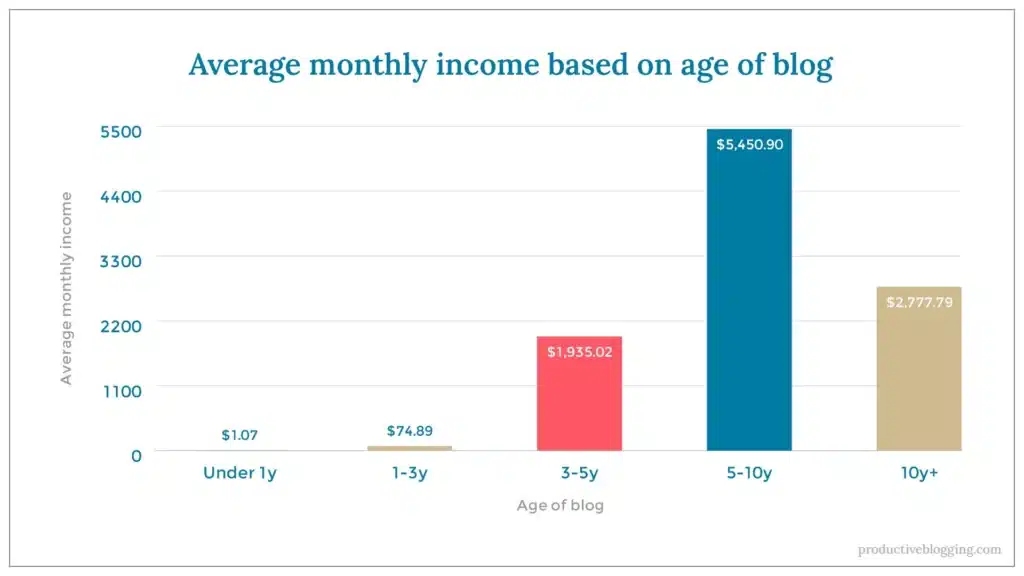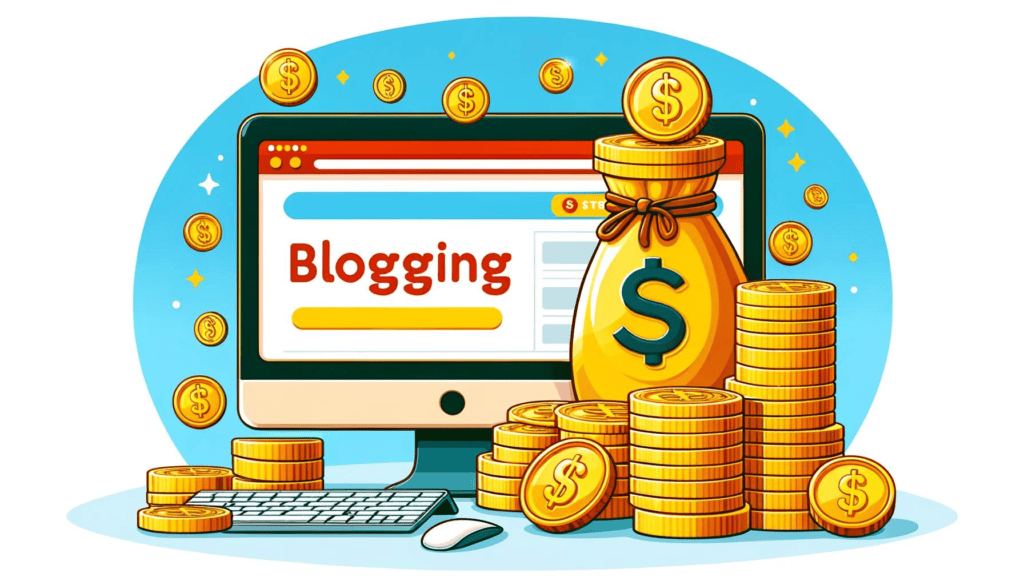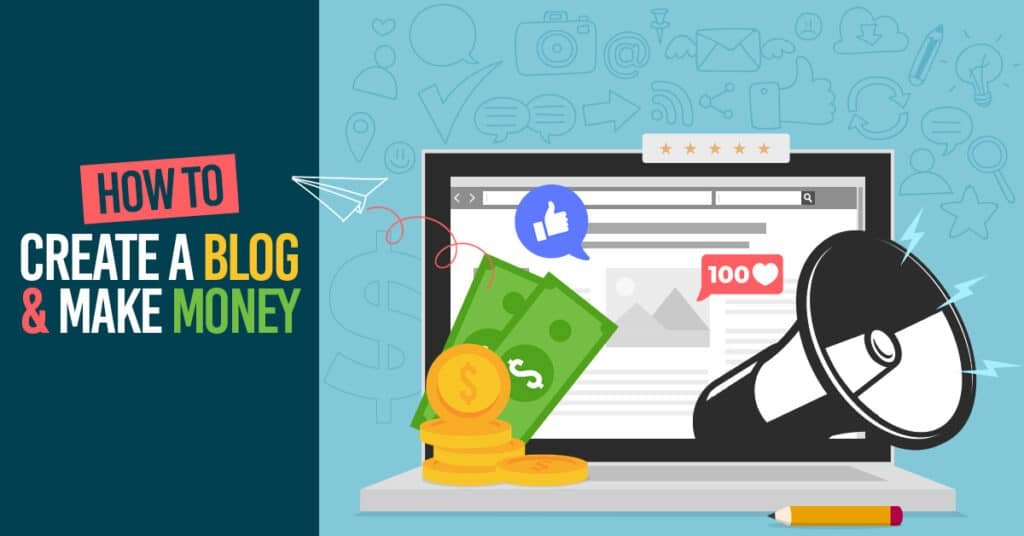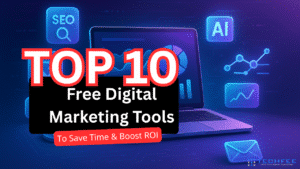How can you make money from a blog and turn your passion into profit?
Every youth these days is looking for opportunities to make money online.
In 2025, blogging will be one of the most lucrative and accessible ways to generate income online.
According to ProductiveBlogging, recent studies reveal that it typically takes around 21 months for bloggers to earn from their efforts. However, this is just an average. Data shows that 28% of bloggers begin making money within their first six months, and an impressive 34% achieve a full-time income within two years of launching their blog.

Imagine You’re sitting in your favorite cozy corner at home, coffee in hand, laptop glowing in front of you. As you type away, crafting your thoughts into a blog post, a notification pops up—another payment from a brand collaboration. This isn’t a fantasy; it’s the reality for thousands of bloggers who’ve turned their passion into a full-time income stream.
Blogging in 2025 is no longer just a hobby or a personal diary—it’s a thriving business model.
With over 4.5 billion active internet users, blogs are a trusted source of information and solutions for audiences worldwide.
From niche-specific advice to product recommendations, blogs have become a go-to platform for brands to reach their customers, creating endless opportunities for content creators to earn.
But what makes blogging even more appealing today is its flexibility and scalability.
Whether you’re a stay-at-home parent, a side-hustler, or an aspiring entrepreneur, blogging offers you the freedom to work on your terms while unlocking the potential for unlimited income.
The digital landscape in 2025 is ripe with possibilities, making it one of the fastest-growing ways to generate revenue online.
In this guide, I’ll take you through expert tips and actionable strategies to help you start earning money from your blog as quickly as possible.
From choosing the right niche to leveraging proven monetization methods, you’ll discover how to turn your blog into a profitable venture without wasting time.
Ready to dive in?
Let’s get started!
How Blogging Makes Money: An Overview

Blogging has evolved into a dynamic platform with multiple revenue streams, making it a highly flexible and rewarding way to earn income.
Blogs generate revenue through various methods, such as advertising, affiliate marketing, sponsored posts, and selling products or services.
By joining ad networks like Google AdSense or partnering with brands for paid collaborations, bloggers can earn money from the content they already produce.
Many also explore affiliate marketing, promoting products they trust and earning commissions for every sale made through their links.
Others create and sell digital products, like eBooks or online courses, while some leverage their expertise by offering freelance services, consulting, or coaching.
These monetization methods allow bloggers to choose what works best for their niche and audience.
Beyond the immediate earnings, blogging is a long-term investment that builds a sustainable income over time.
Unlike traditional jobs where income is tied to hours worked, blogs continue to generate revenue long after content is published.
With consistent effort, blogs grow in traffic, authority, and audience trust, creating compounding income potential.
Blogging also offers scalability—what starts as a small side hustle can transform into a thriving business with multiple revenue streams.
This long-term perspective makes blogging an income source and a digital asset that appreciates as it matures.
Start with a Profitable Niche
Choosing the right niche is the cornerstone of building a successful and income-generating blog.
A profitable niche strikes a balance between passion and market demand.
While writing about something you’re passionate about keeps you motivated, market demand ensures there’s a substantial audience interested in your content.
To maximize profitability, look for niches with low competition but clear monetization potential, such as opportunities to promote affiliate products, sell digital courses, or attract sponsorships.
A well-chosen niche positions you as an authority and makes connecting with a target audience willing to invest in your solutions easier.
Some examples of successful blogging niches include;
- Personal Finance: Offers actionable advice on saving, budgeting, and investing, catering to readers looking for financial stability and growth.
- Health and Fitness: Attracts an audience seeking wellness tips, workout routines, and lifestyle improvements.
- Tech and Gadgets: A booming niche with high demand for product reviews, comparisons, and tech trends, ideal for affiliate marketing and sponsorships.
- Food and Travel: Inspires readers with recipes, culinary adventures, and travel experiences while providing numerous brand collaborations and affiliate promotion opportunities.
These niches have proven demand and offer multiple avenues for monetization, making them ideal for anyone aiming to build a profitable blog.
Build Your Foundation for Success
To create a successful blog, you need a solid foundation that supports growth and monetization.
Start by choosing a professional and reliable platform, such as WordPress, which offers customization, scalability, and user-friendly tools to build your blog.
A self-hosted WordPress site gives you complete control over your branding, design, and monetization options, making it the preferred choice for serious bloggers.
Pair it with a reputable hosting provider to ensure fast loading times and a seamless user experience.
Once your blog is set up, focus on creating high-quality, value-driven content that resonates with your target audience.
Your blog posts should address specific problems, answer questions, or provide insights that your readers find valuable.
Consistency in delivering informative, engaging, and original content builds trust and keeps your audience coming back for more.
The more value your content provides, the easier it becomes to convert visitors into loyal readers and customers.
Finally, implement SEO basics to attract organic traffic to your blog.
This includes conducting keyword research to identify terms your audience is searching for, optimizing titles and meta descriptions, and using internal and external links to boost content visibility.
Ensuring your blog is mobile-friendly, fast, and easy to navigate also enhances your chances of ranking higher in search engines.
A strong SEO strategy brings in consistent traffic, which is essential for long-term blogging success.
Proven Ways: How Can You Make Money from A Blog

a. Advertising Revenue
Advertising revenue is one of the most common and straightforward ways to monetize a blog.
By joining ad networks such as Google AdSense or premium options like Mediavine, bloggers can display ads on their website and earn money based on impressions (CPM) or clicks (CPC).
These networks handle the ad placement and optimization, making it a hassle-free way to generate passive income, especially for blogs with steady traffic.
However, it’s essential to weigh the pros and cons of ad placements on your blog.
On the positive side, ads can provide a consistent income stream without requiring active effort once they’re set up.
They also allow you to earn from any audience, even if they don’t buy products or services.
On the downside, excessive or poorly placed ads can disrupt the user experience, making your blog look cluttered and less professional.
Additionally, the earnings per visitor can be low unless your site attracts substantial traffic.
Striking the right balance in ad placement is crucial to maximize revenue while maintaining a great reader experience.
b. Affiliate Marketing
Affiliate marketing is a highly effective and popular method for bloggers to monetize their content.
To get started, you can join affiliate programs offered by platforms like Amazon Associates, ShareASale, or niche-specific affiliate networks.
Once approved, you’ll receive unique affiliate links to promote products or services relevant to your blog’s audience.
Every time a reader clicks on your link and makes a purchase, you earn a commission.
The earnings depend on the affiliate program’s terms, with some offering fixed rates and others a percentage of the sale.
Follow best practices for promoting affiliate products to maximize your affiliate marketing income.
Choose products that align with your blog’s niche and are genuinely valuable to your audience.
Authenticity is key—focus on recommending items you’ve personally used or thoroughly researched to build trust with your readers.
Strategically place affiliate links in high-traffic blog posts, such as product reviews, tutorials, or “best of” lists.
Use clear calls-to-action (CTAs) to encourage readers to click, and always disclose your affiliate partnerships to maintain transparency and credibility.
By targeting the right products and creating compelling content, affiliate marketing can become a significant source of income for your blog.
c. Sponsored Content and Reviews
Sponsored content and reviews offer a lucrative way for bloggers to monetize their platform by partnering with brands.
Collaborating with brands for paid partnerships typically involves writing blog posts, creating reviews, or sharing social media content that promotes a product or service.
Brands value bloggers with loyal and engaged audiences, as this provides an authentic way to reach potential customers.
To find sponsorship opportunities, you can pitch to brands directly or join influencer networks like AspireIQ or IZEA.
Sponsored collaborations can range from product reviews to comprehensive campaigns integrating multiple promotional formats.
To make these partnerships successful:
- Follow tips for crafting authentic sponsored content.
- Prioritize working with brands that align with your blog’s niche and values to ensure the content feels natural and relevant to your audience.
- Be honest about your experiences with the product or service and highlight both its strengths and limitations.
This builds trust with your readers and maintains your credibility.
Additionally, use storytelling to engage the sponsored post and seamlessly integrate the promotion into your content.
Lastly, adhere to disclosure regulations by clearly stating when a post is sponsored, as transparency fosters audience trust and long-term loyalty.
d. Selling Digital Products
Selling digital products is a powerful strategy for bloggers looking to generate a scalable income stream.
Popular options include eBooks on niche topics, online courses where you share in-depth knowledge, and templates or printables that provide immediate value to your readers.
Each product can be delivered instantly, requires no inventory, and sold repeatedly with minimal ongoing effort.
As you build authority in your niche, these digital offerings can quickly become a cornerstone of your income strategy.
Knowing how to create and market your digital offerings effectively is essential to ensure success.
Begin by identifying a core problem your audience faces and develop a product that provides a clear, actionable solution.
Quality matters, so invest time crafting well-structured content and hiring professionals for tasks like graphic design or course platform setup.
Next, showcase your product on dedicated sales pages with compelling copy, persuasive calls-to-action, and testimonials highlighting your expertise and the product’s value.
Promote your offerings through email marketing, social media, and collaborations with other influencers in your niche.
By consistently refining your product and marketing approach, you can build a loyal customer base and enjoy a steady income stream from your digital products.
e. Selling Physical Products
Selling physical products is another effective method to monetize your blog, especially if you have a niche where tangible goods—such as branded merchandise, handmade crafts, or specialty supplies—resonate with your audience.
To begin, set up an online store alongside your blog using platforms like Shopify, WooCommerce, or Etsy, which offer user-friendly interfaces and secure payment options.
Integrating these e-commerce solutions directly into your blog’s structure creates a seamless shopping experience that encourages readers to explore and purchase products without ever leaving your site.
When it comes to strategies for integrating e-commerce into your blog, start by featuring product links and images within relevant content, like tutorials or product roundups, to highlight their practical value.
Use attractive, high-quality visuals and compelling product descriptions that speak to your audience’s interests and pain points.
Consider offering limited-time promotions, discounts, or bundles to entice first-time buyers and build excitement.
Additionally, leverage email marketing campaigns and social media to showcase new releases, share customer success stories, and remind readers of the unique offerings available in your store.
Over time, this approach can help you cultivate a loyal customer base and grow your revenue through both digital and physical channels.
f. Membership and Subscriptions
Membership and subscription models allow you to offer premium, members-only content, creating a steady and predictable income stream.
By providing exclusive content for members, such as in-depth guides, advanced tutorials, behind-the-scenes insights, or early access to new products, you build a tighter community of loyal readers who find additional value in supporting your work.
This approach not only stabilizes your monthly revenue but also fosters a stronger relationship with your audience, as they feel more connected and invested in your blog’s growth.
To implement these memberships smoothly, leverage tools to manage memberships effectively.
Platforms like Patreon, Memberful, or subscription-based WordPress plugins simplify granting access to premium content, handling payments, and managing subscriber accounts.
These solutions integrate directly with your blog, streamlining the user experience for both you and your community.
By carefully curating your content and selecting the right management tools, you can create a sustainable membership model that rewards loyal readers while increasing your blogging income.
g. Offering Services
Offering services is a natural extension of blogging, allowing you to directly monetize your expertise through coaching, consulting, or freelancing.
By transforming your in-depth knowledge into one-on-one or group sessions, you can help clients overcome challenges, reach their goals, and enhance their skills.
Whether you specialize in digital marketing, content strategy, personal finance, or wellness guidance, these services enable you to command higher rates than many passive income streams while providing immediate value to your audience.
Examples of services bloggers often provide include personalized coaching calls, workshops, and courses where you guide clients through step-by-step solutions tailored to their unique situations.
You might offer consulting packages to businesses looking to improve their online presence or brand messaging or provide freelance writing, graphic design, or social media management services that complement your blog’s core topics.
By highlighting your service offerings and showcasing testimonials and case studies, you can turn your blog into not only a source of information, but also a thriving service-based business.
h. Leveraging Multimedia Content
Leveraging multimedia content opens up a wider range of revenue possibilities by connecting your blog with platforms like YouTube or podcasts.
By creating video tutorials, product reviews, or interviews that complement your written content, you can reach a different segment of your audience that prefers visual or audio formats.
Monetization options include YouTube’s Partner Program, which allows you to earn from ads displayed alongside your videos, and podcast sponsorships where brands pay you to mention or endorse their products within your episodes.
Both mediums also help build stronger brand recognition, as your presence extends beyond the written word.
For effective cross-platform monetization, ensure that your content consistently reflects your blog’s niche and brand voice.
Include calls-to-action within your videos and podcast episodes that lead viewers and listeners back to your blog, affiliate offers, or product sales pages.
Utilize show notes, video descriptions, and on-screen overlays to guide your audience towards relevant links.
Repurpose your blog’s top-performing articles into new podcast or video formats, tapping into multiple revenue streams with minimal extra work.
Over time, this integrated approach diversifies your income sources and boosts the overall profitability of your blogging business.
How Long Does It Take to Make Money Blogging?
The timeline for earning money from a blog varies widely and depends on several key factors, including how quickly you can drive consistent traffic, the profitability of your niche, and the level of effort you put into creating high-quality content and promoting your site.
A highly competitive niche may require more time to establish authority, while a less crowded market might allow quicker gains.
Your marketing strategies, networking efforts, SEO optimization, and content production schedule also significantly affect how soon you see a return on your investment.
For beginner bloggers, setting realistic expectations is essential.
Building trust, nurturing an audience, and refining your content strategy takes time.
While some may start earning within a few months, it’s often more common for consistent income to begin appearing around the one- to two-year mark.
Understanding this timeline helps you stay patient, focused, and motivated throughout the growth phase of your blogging journey.
Fastest Ways to Start Earning Money Blogging
If you’re eager to see quick returns, consider focusing on high-impact strategies and prioritizing immediate monetization.
For instance, affiliate marketing allows you to earn commissions by promoting products you’ve personally vetted.
Sponsored posts and brand collaborations can also lead to fast payouts when you partner with companies aligned with your blog’s niche.
Additionally, offering freelance services—like writing, design, or consulting—lets you tap into your existing skill set and generate revenue almost from day one.
The key is to select income streams that don’t solely rely on long-term brand recognition and large audiences so you can start earning as soon as you launch.
To start without a hefty investment, leverage free tools and platforms that streamline your initial steps.
Free blogging platforms, email marketing services, and social media channels help you grow your audience without upfront costs.
Many affiliate networks and influencer marketplaces don’t require a minimum audience size, making it easy to begin promoting products and landing paid deals even when you’re just starting out.
By combining these free resources with a strategic approach to content and promotion, you’ll lay a solid foundation for earning money faster than many new bloggers expect.
Tips to Maximize Your Blogging Income

To significantly boost your earnings, start by optimizing your content for conversions.
This means strategically placing clear calls to action (CTAs) throughout your posts, guiding readers to your affiliate links, product pages, or email sign-up forms.
Internal links that lead to related articles or offers also help keep visitors on your site longer, increasing their chances of making a purchase.
Beyond that, it’s crucial to diversify your income streams so that if one revenue source fluctuates, others can compensate.
Rather than relying solely on advertising or affiliate income, consider mixing digital product sales, membership programs, and service offerings to create a more stable financial foundation for your blog.
Lastly, build trust with your audience, as genuine connections drive sustained growth and higher earnings over time.
By consistently delivering valuable, honest content, responding to reader feedback, and maintaining transparency with product recommendations, you create a loyal community more likely to support your monetization efforts.
Common Challenges in Monetizing Blogs
As you work towards earning from your blog, you’ll likely face a variety of obstacles that can slow your progress.
One of the most persistent traffic hurdles comes from competing with established sites and trying to stand out in a crowded online space.
To overcome this, focus on producing consistently high-quality, search-optimized content that resonates with your target audience.
Engage in guest posting, collaborate with influencers, and make use of social media platforms to widen your reach.
Over time, this will help drive more organic visitors genuinely interested in your niche.
Another common area for improvement is dealing with inconsistent income, which can fluctuate due to seasonal trends, algorithm changes, or shifts in consumer behavior.
To stabilize your earnings, diversify the ways you make money.
Relying solely on one revenue stream can leave you vulnerable if that stream dries up.
Mix in different monetization strategies—such as affiliate marketing, sponsored content, and selling digital products—so that if one source experiences a dip, others can balance it out.
Planning, maintaining a financial protector, and regularly reviewing your strategies will help keep your blog profitable despite the inevitable ups and downs.
Conclusion: How Can You Make Money from A Blog
Starting a blog and earning money from it may seem like a challenging journey, but it’s one well worth taking.
You’ll be on the right track by selecting a profitable niche, building a solid foundation, and consistently producing high-quality content.
Don’t hesitate to experiment with various monetization methods—from affiliate marketing and sponsored posts to digital product sales and membership models.
You can overcome common hurdles like low traffic and income fluctuations with patience, persistence, and the right strategies.
Take small steps, refine your approach based on what resonates with your audience, and never stop learning.
The sooner you start, the sooner you’ll be laying the groundwork for a rewarding blogging business, so why wait? Get started today and watch your blog grow into a thriving source of income.
If you found this post helpful, please share it with others who might benefit from it! We’d love to hear your thoughts and opinions, so don’t hesitate to comment below. Also, make sure to subscribe to our email newsletter for more insightful content and updates.
Also, Join Our Group, where we can share ideas and insights, collaborate with like-minded people, and learn and grow together in the digital marketing field.
Thank you for your support!
Stay in the Loop: Get Exclusive Tips Straight to Your Inbox!
Curious about the latest money-making strategies, insider blogging secrets, and actionable advice you won’t find anywhere else? Sign up for our newsletter now and be the first to receive brand-new insights, time-saving tips, and special offers—right in your inbox. Don’t miss out!
Frequently Asked Questions
How do bloggers get paid?
Bloggers typically earn through ads, affiliate marketing, sponsored posts, selling products or services, and membership programs.
Can I make $1,000/month from blogging?
Yes. With the right niche, consistent high-quality content, effective SEO, and diversified monetization strategies, many bloggers achieve $1,000 or more per month.
What type of blog earns the most money?
Blogs in high-demand niches with profitable affiliate products or services—such as finance, health, and tech—often earn the most.
Is it free to start a blog and make money?
You can start a blog for free using platforms like Blogger or WordPress.com, but investing in a self-hosted site often leads to greater earning potential.
How do beginner bloggers make money?
Beginners typically start with simple methods like display ads, low-commission affiliate programs, or basic freelance writing services before scaling up.
Do you need experience to be a blogger?
No formal experience is necessary. Consistent learning, practicing good writing habits, and understanding your audience’s needs are key.
How can I make $100 a month blogging?
Focus on one or two monetization methods, such as affiliate marketing or ads, and consistently publish targeted, valuable content to reach a $100 monthly goal.
What kind of blogs make money?
Any niche can earn money if there’s a dedicated audience, valuable content, and relevant monetization strategies. Popular niches include lifestyle, finance, health, and tech.
How do I find affiliate programs to join?
Search affiliate networks (like ShareASale or CJ Affiliate), check brand websites for affiliate pages, or use search engines to discover niche-specific programs.
Which blog site is best for earning money?
A self-hosted WordPress blog generally offers the most flexibility, customization, and monetization options, making it a top choice for earning money.









